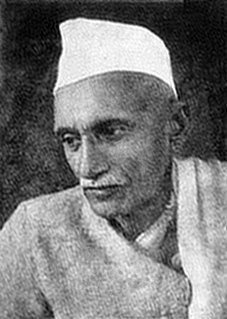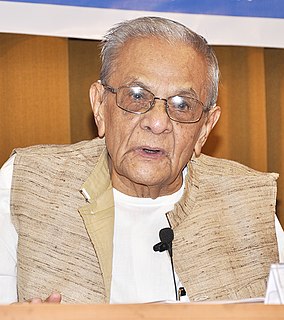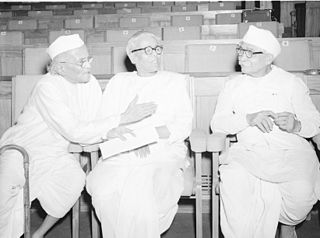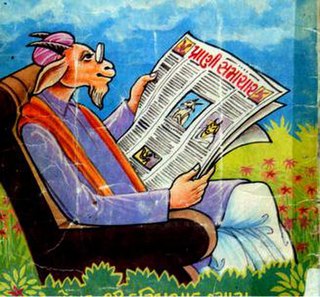Related Research Articles
Dina Pathak was an Indian actress and director of Gujarati theatre and also a film actor. She also was an activist and remained the President of the "National Federation of Indian Women" (NIFW).

Ravishankar Vyas, better known as Ravishankar Maharaj, was an Indian independence activist, social worker and Gandhian from Gujarat.
The history of Gujarati literature may be traced to 1000 AD, and this literature has flourished since then to the present. It is unique in having almost no patronage from a ruling dynasty, other than its composers.
Ranjitram Suvarna Chandrak, also known as the Ranjitram Gold Medal, was founded by Gujarat Sahitya Sabha and is considered the highest literary award in Gujarati literature. The award is named after renowned Gujarati writer Ranjitram Mehta. It is awarded since 1928.
Ambulal Balkrishna Purani was an Indian writer. He was a prominent disciple and biographer of Sri Aurobindo.
Shanta Kalidas Gandhi was an Indian theatre director, dancer and playwright who was closely associated with IPTA, the cultural wing of the Communist Party of India. She studied with Indira Gandhi at a residential school in the early 1930s, and remained close to the prime minister in later life. She received many government awards and sinecures under the Indira Gandhi administration, including the Padma Shri (1984) and being made chairperson of the National School of Drama (1982–84).
Gujarati theatre refers to theatre performed in the Gujarati language, including its dialects. Gujarati theatre is produced mainly in Gujarat and Maharashtra, in cities like Mumbai, Ahmedabad and Baroda, surat and else where Gujarati diaspora exists, especially North America. Rustam Sohrab, performed by Parsee Natak Mandali on 29 October 1853 in Mumbai, marked the beginning of Gujarati theatre.

Dhirubhai Premshankar Thaker was an Indian Gujarati writer, who was best known for creating the Gujarati Vishwakosh, a 25-volume encyclopedia of the Gujarati language.

Jaishankar Bhudhardas Bhojak, better known by his theatre name Jaishankar Sundari , was an Indian actor and director of Gujarati theatre. Starting at the young age, he rose to fame for his roles of female impersonator in early Gujarati plays. He retired from acting in 1932 but returned to theatre direction and teaching in 1948. He directed and acted in several successful plays. He was awarded the Ranjitram Suvarna Chandrak in 1951 and the Padma Vibhushan in 1971.

Jayanti Ghelabhai Dalal was an Indian author, publisher, stage actor, director and politician. Born in family of theatre organiser and involved in politics during and after independence of India, he was influenced by socialism and Gandhian philosophy. He wrote one-act plays, short stories and edited publications.

Amrit Keshav Nayak was a Parsi theatre actor-director, lyricist and Gujarati author. He joined theatre at early age and later directed several plays including adaptations of plays of Shakespeare. He wrote plays and novels also.

Bakor Patel is children's literature character created by Hariprasad Vyas for funny animal stories published by Gandiv, a children's biweekly in Gujarati language published by Gandiv Sahitya Mandir, Surat, Gujarat, India. The humorous stories about Bakor Patel written by Vyas which first appeared in 1936 and continued till 1955. The stories include other anthropomorphic characters including his wife, Shakri Patlani. The stories were accompanied with an illustration and title printed in typical typography which were drawn by two Surat based artist brothers, Tansukh and Mansukh. The character became the icon of Gujarati children's literature and was adapted into a children's play.

Ramnarayan Vishwanath Pathak was a Gujarati poet and writer from India. Profoundly influenced by Gandhian thought, Pathak wrote criticism, poetry, drama, metrics and short stories. He edited and translated literary works. He was appointed as the president of Gujarati Sahitya Parishad in 1946. He was awarded the Gujarati literary prizes Narmad Suvarna Chandrak for Prachin Gujarati Chhando in 1949 and Sahitya Akademi Award for Bruhat Pingal in 1956.
Rasiklal Chhotalal Parikh (1897–1982) was a 20th-century Gujarati poet, playwright, literary critic, Indologist, historian, and editor from Gujarat, India. He was the president of Gujarat Sahitya Sabha and was appointed as the president of Gujarati Sahitya Parishad in 1964. He received the Sahitya Akademi Award in 1960 for his play Sharvilak. He is also a recipient of the Ranjitram Suvarna Chandrak and the Narmad Suvarna Chandrak.
The Indian National Theatre (INT) is a theatre organisation and troupe founded in 1944 and based in Mumbai, India. Although performing predominantly Gujarati theatre, the troupe has also produced a number of plays in other Indian languages. In addition to theatre productions, the troupe also carries theatre education, training and research activities.

Bapulal Nayak was an Indian stage actor, director and manager of the early Gujarati theatre. Born into a family of traditional folk theatre performers, he joined the theatre company Mumbai Gujarati Natak Mandali at a young age. His acting was well received in his initial roles. He was involved in stage planning and managing and later became a partner in the company. He rose to fame and acted in several successful plays with Jaishankar Bhojak 'Sundari', who played female roles opposite him. He acted in plays written by Mulshankar Mulani, Gajendrashnakar Pandya and Nrisinh Vibhakar. He wrote and directed several plays and eventually bought the theatre company. After a career lasting five decades, he retired after his company suffered heavy loss with the advent of the cinema.
Pransukh Manilal Nayak was an Indian Gujarati theatre actor, director, manager, and playwright from Gujarat, India. Born into a family of traditional theatre actors, he joined theatre troupes at a young age and rose to fame for his comic roles and female impersonations. His performances as a woman from Banaras in Kumali Kali and as Jivram Bhatt in Mithyabhiman were acclaimed. During his long career, he worked with many theatre companies and gave 22,455 performances, earning a listing in the 1989 Guinness Book of Records.
Kavasji Palanji Khatau, also spelled Cowasji Palanji Khatao, was a singer, actor, director, and owner of a Parsi theatre company, who started his career with the Empress Victoria Theatrical Company. Despite opposition from his employers, he introduced Mary Fenton, his wife and the first Anglo-Indian actress, to the stage. This led him to start his own company, the Alfred Theatre Company, where he, his wife, and other actors had successful careers.
Hariprasad Gangashankar Shastri was an Indian scholar, historian, epigraphist, indologist and editor primarily known for his work on the political and cultural history of Gujarat state. He spent much of his career at the B. J. Institute of Learning and Research, Ahmedabad as a lecturer, professor, deputy director and then as director.
Gujarati Natak Mandali (1878–89) and its successor Mumbai Gujarati Natak Mandali (1889–1948) was a theatre company in Bombay, British India. It gave immense contributions to the Gujarati theatre, with productions of more than hundred plays, as well as the training and introducing of many major actors and directors.
References
- 1 2 3 4 5 6 Baradi, Hasmukh (2004). Lal, Ananda (ed.). The Oxford Companion to Indian Theatre. Oxford University Press. doi:10.1093/acref/9780195644463.001.0001. ISBN 9780195644463 – via Oxford Reference.
- 1 2 Garagi, Balwant (1962). Theatre in India. Theatre Arts Books. p. 132.
- 1 2 Hansen, Kathryn (2013-12-01). Stages of Life: Indian Theatre Autobiographies. Anthem Press. p. 342. ISBN 978-1-78308-098-4.
- ↑ George, K. M. (1997). Masterpieces of Indian Literature: Assamese, Bengali, English, Gujarati, Hindi, Kannada, Kashmiri, Konkani & Malayalam. New Delhi: National Book Trust. p. 360. ISBN 978-81-237-1978-8.
- ↑ The Illustrated Weekly of India. 81. Published for the proprietors, Bennett, Coleman & Company, Limited, at the Times of India Press (published January 1960). 1960. p. 33.
- 1 2 Leiter, Samuel L. (2007). Encyclopedia of Asian Theatre: O-Z. Greenwood Press. p. 746. ISBN 978-0-313-33531-0.